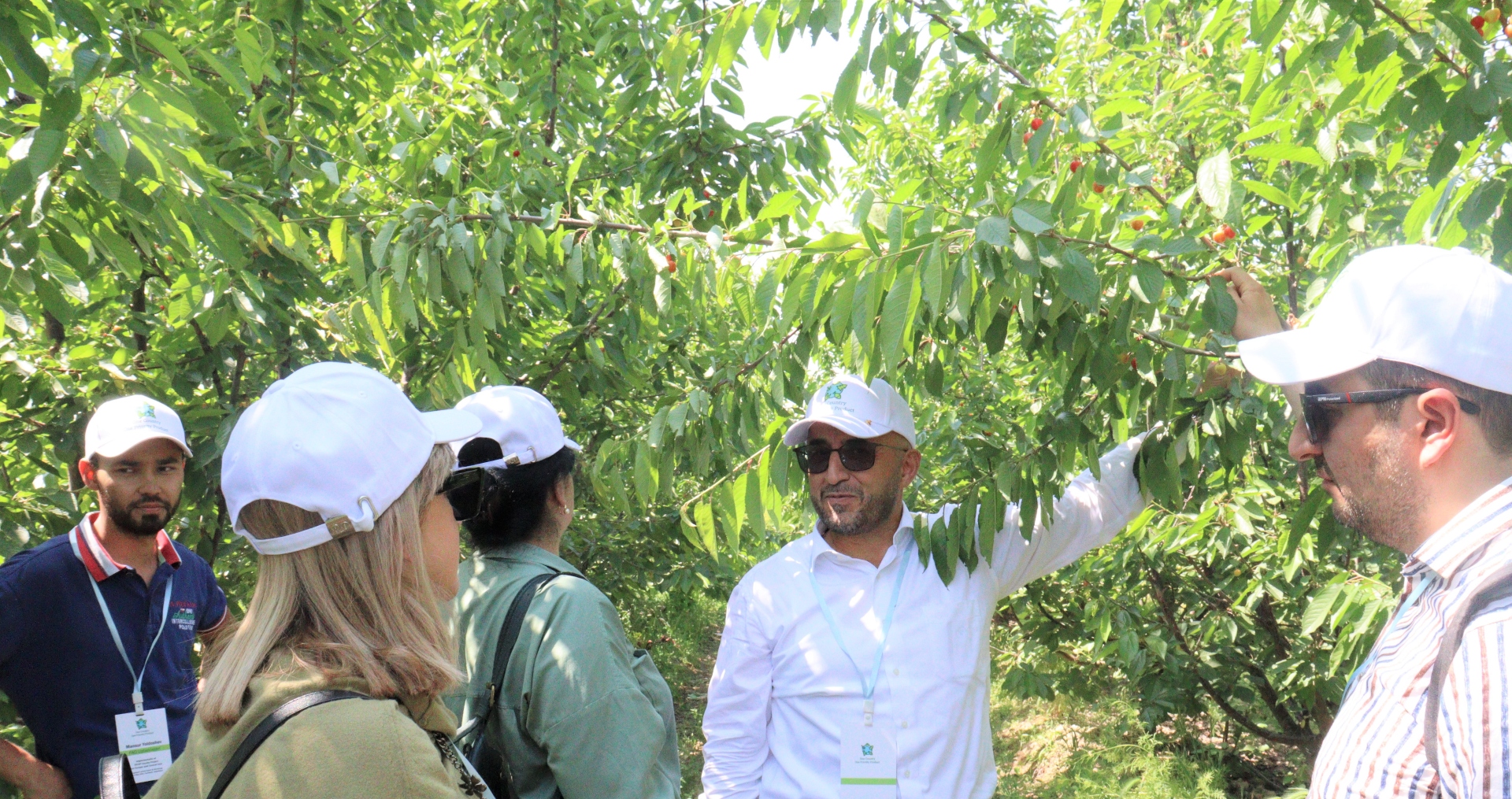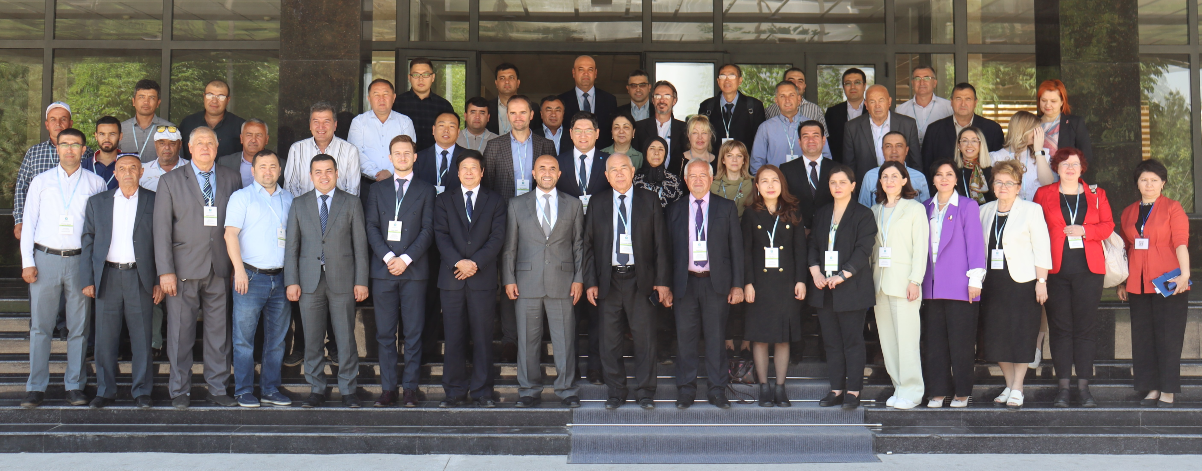News
Launch event and workshop kicks off OCOP country projects in Europe and Central Asia

Tashkent, Uzbekistan – A milestone was passed in the One Country One Priority Product Initiative (OCOP) when the FAO regional launch event and workshop for implementation of the OCOP in Europe and Central Asia was held in Tashkent, Uzbekistan during 2-3 May 2023, hosted by FAO in cooperation with the national Ministry of Agriculture.
Participants included OCOP national focal points from the Governments and FAO Country Offices in Albania, Armenia, Georgia, Kyrgyzstan, Moldova, Serbia, Tajikistan, Türkiye and Uzbekistan. They came together with agrifood value chain specialists, leading sweet cherry experts from China, and a wide range of stakeholders from development partners, research organisations, farmers associations and the private sector in Uzbekistan.
Discussions during the launch event and workshop
Event participants were welcomed by Sherzod Umarov, Assistant FAO Representative in Uzbekistan who then facilitated the first session. Alisher Shukurov, Advisor to Minister for Agriculture welcomed the participants on behalf of the Government of Uzbekistan and conveyed their commitment to making the implementation of OCOP a success in farmers’ fields.
In his opening and introductory remarks, Xia Jingyuan, Director of FAO Plant Production and Protection Division (NSP), thanked everyone for their active participation and explained the concept and objectives of the OCOP Initiative. In a special welcome for the national focal points who will work on OCOP country projects in the region, he introduced them to the wider OCOP community, and urged everyone to get on board with efforts toward the successful implementation of the OCOP Initiative, leaving no one behind.
Progress updates on the implementation of OCOP from global-, regional-, and country-level perspectives were presented respectively by Hafiz Muminjanov, OCOP Global Coordinator; Pedro Marcelo Arias, OCOP regional focal point in Europe and Central Asia; and Zafar Artikov, Head of the Department of Agricultural Production at the Ministry of Agriculture of Uzbekistan. Furthermore, the importance of sweet cherries and potential for sustainable value chain development were discussed. Notable contributions were made by technical experts from the Shandong Institute of Pomology, China, as well as key stakeholders including the UNDP Office in Uzbekistan, a World Bank-funded project, and the Raffaella Foundation in Uzbekistan.

The participants visited sweet cherry orchards run by the “Agro Development” company to learn more about varieties and crop management technologies. This visit gave rise to an interactive discussion about the promotion of this Special Agricultural Product (SAP). A proposal was welcomed to establish 3 to 4 demonstration plots in different regions of Uzbekistan that could produce modern varieties of sweet cherries and use sustainable technologies for production, storage, processing, and marketing. The participants also visited a local fruit market and the cold storage facilities of the private “Tashkent Food City” company.
The OCOP national focal points from nine countries across the Europe and Central Asia region presented the importance, the comparative advantage, and the need for support of their selected SAPs: chestnuts (Albania), greens (Armenia), wine (Georgia), walnuts (Kyrgyzstan), table grapes (Moldova), raspberries (Serbia), apricots (Tajikistan), figs (Türkiye), and sweet cherries (Uzbekistan).
Further insights and reflections were contributed by various stakeholders, which represented Leili Smart Fertilizer Company from China, the international development projects, the sweet cherry producers, the exporters, and the processing companies. During the group discussions, several key issues were highlighted, including the coordination mechanism, technical synergies, capacity development, multistakeholder engagement, communication and outreach, and partnership and resource mobilization.
Director Xia concluded the meeting with his congratulations for a successful event and looking forward to the fruitful implementation of OCOP in Uzbekistan and the wider region. He advised the national focal points to report to the event outputs and progress updates discussed to Governments and Heads of FAO Country Offices. He also emphasized that since Uzbekistan began implementing the OCOP as a demonstration country, ahead of others in the region, their experiences should serve as an example for other countries to follow.

First Meeting of the OCOP National Task Force in Uzbekistan
On 4 May, Director Xia joined the first meeting of the OCOP National Task Force (NTF) in Uzbekistan, which discussed the three-year work plan for the sustainable development of sweet cherries. The meeting was attended by all NTF members, composed of representatives from the Ministry of Agriculture, Uzbekistan, the FAO Country Office in Uzbekistan, research institutes, universities, private sectors, and farmers’ associations. The government expressed strong support for the OCOP Initiative and committed to joining efforts for mobilizing resources.
Director Xia gave guidance on establishing an efficient coordination mechanism for promoting sweet cherries to improve food security and farmers’ incomes while also contributing to the FAO Country Programming Framework and the UN Sustainable Development Goals.
Training on sweet cherry production
On 4 May, a training session on sweet cherry breeding, rapid multiplication, and improving the quality of fruits was conducted at Tashkent International Agricultural University. A big group of researchers, university professors, farmers, and business representatives had an interactive discussion on this topic, along with researchers from Shandong Research Institute of Pomology who shared their knowledge and expertise.
The way forward
This regional launch event and workshop hosted in Uzbekistan was the first in a series of launches for country projects in each FAO region. Four similar events are scheduled to be hosted in Malawi, Bangladesh, Egypt, and Trinidad and Tobago, from May until October 2023.
